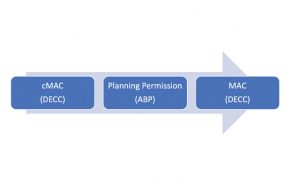
Strengthening the sustainable nature of the renewable energy industry
29th April 2021
Renewable energy: The need for public buy-in
29th April 2021The future of offshore wind consenting

Ireland’s antiquated offshore renewable energy (ORE) consenting regime is set for an extensive overhaul in the coming months as the long-awaited Marine Planning and Development Management (MPDM) Bill is due to be finalised by the end of Q1 2021. The Climate Action Plan (CAP) published in June 2019 set a target of at least 3.5GW of ORE by 2030. However, this was later increased to 5GW in the Programme for Government. The MPDM and associated secondary legislation will be key to unlocking thousands of MW’s in ORE projects which are urgently needed to help meet these ambitious renewable energy targets.
At the heart of the MPDM Bill is the so-called single consent principle i.e. one state consent to enable occupation of the maritime area and one development consent, with a single environmental assessment. The state consent will take the form of a Maritime Area Consent (MAC), which for ORE projects will be granted by the Minister in the Department of the Environment, Climate and Communications (DECC). The MAC will set out the financial terms and contractual obligations, similar to a land lease, but will not confer any consent to construct. The Minister will in essence be acting qua landlord and therefore will not be required to carry out any environment assessment. A developer will not be entitled to be granted a MAC until it has first obtained development consent for the project in question.
The development consent will take the form of a planning permission, which for ORE projects will be granted by An Bord Pleanala (ABP). The development consent provisions are set out in Part 5 of the MPDM Bill and are modelled on the existing Strategic Infrastructure Development provisions in the Planning Acts. ABP will be responsible for carrying out the necessary environmental assessments – Environmental Impact Assessment and Appropriate Assessment.
The developer of an ORE project will not be able to apply to ABP for a planning permission until it has first secured a conditional MAC (cMAC) from the Minister. In many ways this mirrors the existing precondition under the terrestrial planning system whereby the applicant for permission must first show sufficient title or interest in the subject lands. In order to obtain a cMAC, which was known as a Planning Interest in an earlier iteration of the MPDM Bill, the developer must first show to the Minister’s satisfaction that it is a “fit and proper person” with the technical and financial capabilities to complete and construct the project.
The consenting chronology is summarised in figure 1 below.
Next steps:
Pre-legislative scrutiny of the General Scheme of the MPDM was carried out by the Oireachtas Joint Committee on Housing, Local Government and Heritage (JOC) in November and December 2020 with a series of public hearings. At the time of writing (January 2021), the JOC Report is expected at the end of this month. The legal text of the MPDM is currently being finalised by the Office of the Parliamentary Draftsman and will also be published in January 2021. At that point it is expected there will be a short period of further stakeholder engagement. It is hoped that the MPDM Bill will be finalised by 31 March 2021 in line with the commitment made in the Programme for Government. At that stage the MPDM Bill will be put before the Oireachtas for debate, amendment and enactment.
Conclusion:
Enactment of the MPDM Bill and associated secondary legislation this year is crucial if we are to stand any chance of meeting our 2030 ORE targets. Equally important is the requirement to properly resource both DECC and ABP who will be processing these consent applications. However, consenting is only one piece in the jigsaw. In tandem with the proposed overhaul of the ORE consenting regime, we need to urgently progress the grid connections, starting with the so-called Phase 1 Projects (aka “Relevant Projects”) identified in the MPDM Transition Protocol. DECC also needs to publish the rules for the first dedicated ORE RESS Auction, to be held in Q4 2021.
There is no doubt that the extent of the challenge is great, but so too is the scale of the opportunity.
About the author: Ainsley Heffernan is a partner and head of the award winning Energy & Natural Resources Group in Beauchamps. Ainsley and his team have extensive experience representing clients involved in wind farm projects, both on-shore and off-shore. The Beauchamps Energy Team has provided bespoke consenting and regulatory law advice to six of the seven legacy offshore wind farms which were recently awarded Relevant Project status by the Irish Government.

